If you’re looking for a unique and adventurous way to experience the outdoors, wild camping on Dartmoor might be just what you need. Dartmoor National Park is a vast expanse of moorland in Devon, England, with plenty of opportunities for wild camping. With its rugged terrain and stunning scenery, it’s no wonder that Dartmoor is a popular destination for outdoor enthusiasts.
Before you set out on your wild camping adventure, it’s important to know the rules and regulations. Dartmoor has specific areas where wild camping is permitted, which are marked on an interactive map.
These areas include the north and south moorland plateaus, as well as a few smaller areas in the east. It’s also important to follow the Leave No Trace principles and respect the environment to ensure that future generations can enjoy the beauty of Dartmoor.
You May Also Like..
Dartmoor National Park
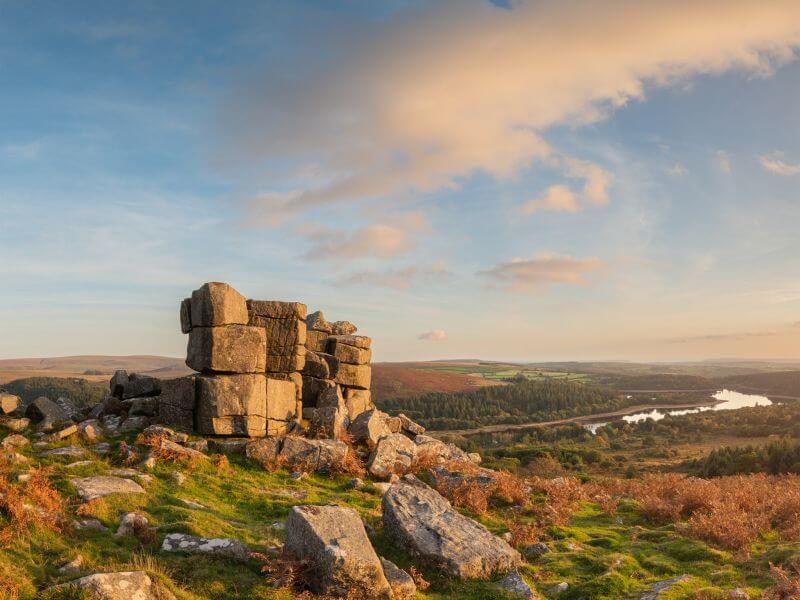
If you’re planning to go wild camping on Dartmoor, it’s important to understand the landscape and the rules that govern camping in this area. Dartmoor is a vast, open moorland in the southwest of England, covering 954 square kilometers the area is one of the most beautiful places to visit in Devon. The landscape is characterized by granite tors, heather-clad moors, bogs, and rivers. The area is also home to a variety of wildlife, including ponies, sheep, and birds of prey.
When wild camping on Dartmoor, it’s important to respect the environment and follow the rules. The Dartmoor National Park Authority has a code of conduct for wild camping, which includes guidelines on where to camp, how to dispose of waste, and how to minimize your impact on the environment. Some of the key rules to keep in mind include:
- Camp at least 100 meters away from any road or building
- Camp for no more than two nights in one place
- Use a stove for cooking, rather than an open fire
- Bury human waste at least 30 meters away from water sources and bury it at least 15 centimeters deep
- Take all litter with you when you leave
By following these rules, you can help to preserve the natural beauty of Dartmoor and ensure that it remains a great place to visit and camp for generations to come.
It’s also important to be prepared for the weather when camping on Dartmoor. The area is known for its changeable weather, and it’s not uncommon to experience sunshine, rain, and wind all in the same day. Make sure you bring appropriate clothing and equipment for all weather conditions, including a waterproof jacket, warm layers, and sturdy footwear.
Wild camping on Dartmoor can be a fantastic experience, providing an opportunity to connect with nature and enjoy the stunning landscape of this unique area. By understanding the rules and respecting the environment, you can ensure that your camping trip is safe, enjoyable, and sustainable.
Essentials of Wild Camping
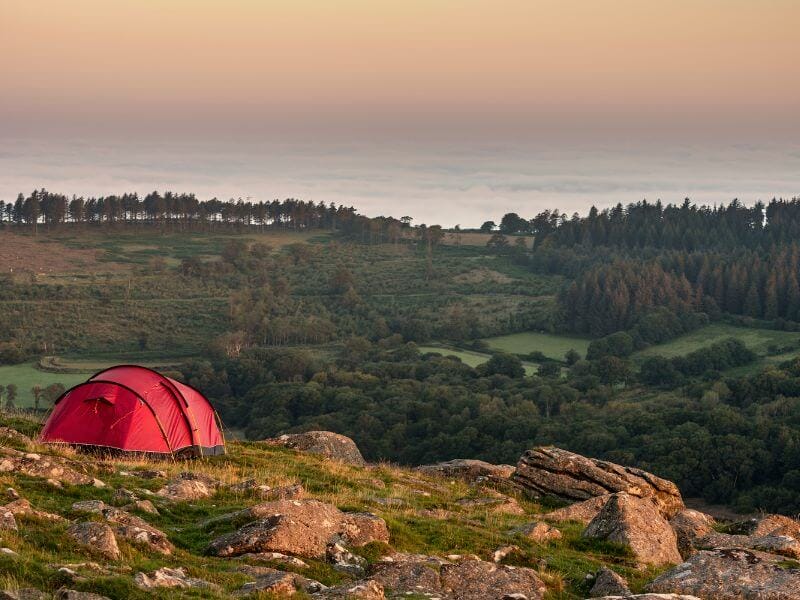
When planning a wild camping trip on Dartmoor, there are a few essentials you should keep in mind to ensure a safe and enjoyable experience.
Tent
Your tent is your home away from home, so it’s important to choose one that is durable, easy to set up, and provides adequate protection from the elements. Look for a tent that is lightweight and compact such as this one, as you’ll need to carry it with you on your hike. A two-person tent is usually sufficient for solo travelers, while larger groups may need to consider a larger tent.
Sleeping Bag and Mat
A good sleeping bag is essential for staying warm and comfortable during the night. Look for one that is rated for the temperatures you expect to encounter on your trip.
A sleeping mat will provide insulation from the ground and add an extra layer of comfort. I recommend getting a lightweight self-inflating sleeping mat as this will give you more comfort whilst saving on weight. This Big Agnes sleeping mat is one of the best available.
Food and Water
Bring enough food and water to last your entire trip, as there may not be any reliable sources of water on your route. Consider bringing water purification tablets or a filter if you plan to refill your water bottles from streams or other natural sources.
Navigation
Dartmoor can be a challenging place to navigate, so it’s important to bring a map and compass. Familiarize yourself with the route before you set out, and be prepared to make adjustments if necessary. Don’t rely on just your phone as these can run out of battery quickly. GPS devices such as this Garmin GPS can be helpful, but should not be relied on as your sole means of navigation.
Clothing and Footwear
Dartmoor’s weather can be unpredictable, so it’s important to bring clothing that is suitable for a range of conditions. A waterproof jacket and trousers are essential, as are warm layers and a hat. Good quality hiking boots with ankle support and a good grip are also essential for navigating rocky terrain.
Survival Tools
When camping in the wild, it’s important to be prepared for any situation. You should bring a survival kit that includes a map and compass, a first-aid kit, a multi-tool, a fire starter, and a whistle. These tools can help you navigate your way through the wilderness, treat injuries, start a fire, and signal for help if needed.
Leave No Trace
Finally, remember to follow the principles of Leave No Trace. Pack out all your rubbish, avoid damaging vegetation, and use established campsites where possible. Respect the local wildlife and other campers, and leave the landscape as you found it for others to enjoy.
Selecting Your Camping Spot
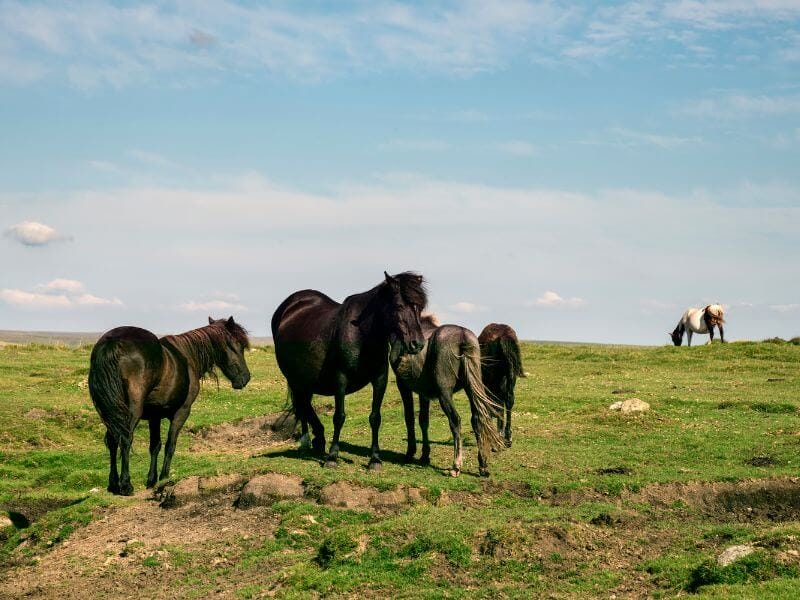
When it comes to wild camping on Dartmoor, selecting the right camping spot is crucial for a comfortable and enjoyable experience. Here are some tips to help you choose the perfect spot for your wild camping adventure:
Look for a flat and dry area
Make sure to choose a flat and dry area to pitch your tent. Avoid camping in low-lying areas or near water sources as they can be prone to flooding. If you are camping in the summer, be aware that Dartmoor can get quite dry, so make sure to check for any fire warnings before setting up camp.
Check the wind direction
Dartmoor is known for its windy weather, so it’s important to check the wind direction before selecting your camping spot. Look for natural windbreaks such as trees or rocks to provide some shelter from the wind. If you can’t find a natural windbreak, consider bringing a windbreak or tarp to create your own shelter.
Consider privacy
While wild camping on Dartmoor is allowed in designated areas, it’s important to respect the privacy of other campers. Look for a spot that is not too close to other camping groups to ensure a peaceful and private camping experience.
Respecting the Environment
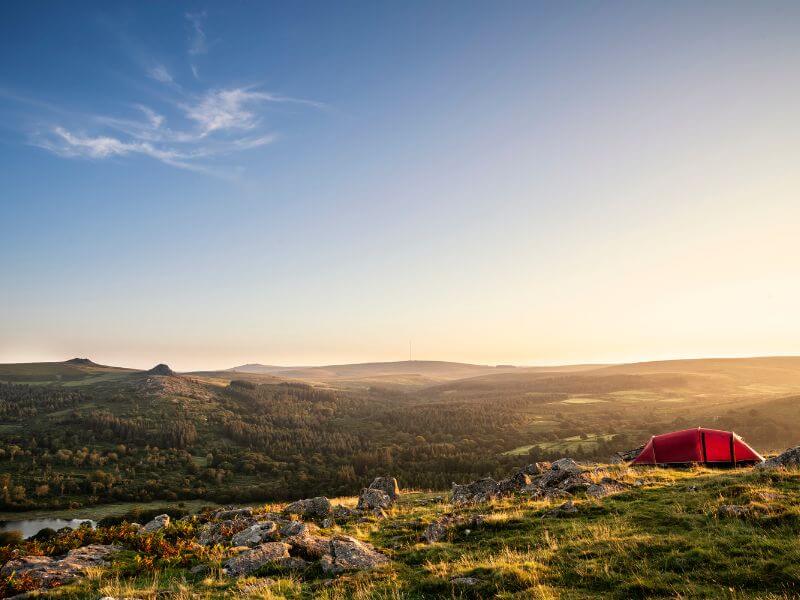
When wild camping on Dartmoor, it’s important to remember that you are in a natural environment and should take steps to minimize your impact on the area. Here are some tips to help you respect the environment:
Leave No Trace
The Leave No Trace principle is essential when wild camping on Dartmoor. This means that you should leave the area exactly as you found it, without leaving any trace of your visit. Here are some ways to follow this principle:
- Pack out all your trash, including food scraps and toilet paper. Use a sealable bag to store your trash until you can dispose of it properly.
- Use a stove instead of a fire to cook your meals. If you must have a fire, use a designated fire ring or build a fire on bare mineral soil, away from vegetation and other flammable materials. Make sure to put out the fire completely before leaving the area.
- Avoid damaging vegetation and wildlife by staying on established trails and campsites. Don’t cut down trees or damage plants. Use a tarp or groundsheet to protect the ground from damage caused by your tent.
- Respect other campers’ privacy and space by camping at least 100 meters away from other tents.
Wildlife Interaction
Dartmoor is home to a wide variety of wildlife, including ponies, birds, and insects. While it can be exciting to see these animals up close, it’s important to remember that they are wild and should be treated with respect. Here are some tips for interacting with wildlife:
- Observe wildlife from a distance and avoid approaching or feeding them. Feeding wildlife can cause them to become dependent on human food and can be harmful to their health.
- Store your food and trash in a bear-resistant container or hang it from a tree at least 4 meters above the ground and 2 meters away from the trunk. This will prevent wildlife from getting into your food and trash.
- Avoid camping near streams or other water sources, as this can disrupt wildlife habitat and cause erosion. Use a water filter or purification tablets to treat water from natural sources before drinking it.
By following these tips, you can help preserve the natural beauty of Dartmoor for future generations to enjoy.
Safety Measures
When planning for a wild camping trip on Dartmoor, it is crucial to take safety measures seriously. Here are some important safety measures to keep in mind:
Weather Conditions
Dartmoor’s weather can be unpredictable, and it is essential to be prepared for all conditions. Before you head out, check the weather forecast and plan accordingly. Here are some tips to help you prepare for different weather conditions:
- Rainy weather: Bring waterproof clothing and gear, such as a waterproof tent and backpack cover. Pack your gear in waterproof bags or containers to keep them dry.
- Hot weather: Bring a hat, sunscreen, and plenty of water to stay hydrated. Wear lightweight, breathable clothing to stay cool.
- Cold weather: Bring warm clothing, such as a down jacket, hat, and gloves. Pack a sleeping bag rated for colder temperatures.
First Aid Preparation
Accidents can happen, and it is essential to be prepared with a well-stocked first aid kit. Here are some essential items to include in your first aid kit:
- Bandages: Include a variety of bandages in different sizes to cover cuts and scrapes.
- Antiseptic wipes: Use these to clean wounds and prevent infection.
- Pain relievers: Include pain relievers, such as ibuprofen or acetaminophen, to alleviate headaches or other aches and pains.
- Tweezers: Use tweezers to remove splinters or ticks.
- Emergency blanket: Bring an emergency blanket to stay warm in case of an emergency.
It is also a good idea to take a first aid course before heading out on your camping trip. Knowing basic first aid skills can be invaluable in an emergency situation.
By taking these safety measures seriously, you can help ensure a safe and enjoyable wild camping experience on Dartmoor.
Legal Considerations

When it comes to wild camping on Dartmoor, there are some legal considerations to keep in mind. While wild camping is generally tolerated in most national parks in England and Wales, it is only explicitly legal in Dartmoor National Park.
However, even in Dartmoor, there are rules and regulations that you need to follow to ensure that you are camping legally. For example, you are only permitted to backpack camp, which means carrying your own equipment as part of your walk and staying for one or two nights max. You can only do this in certain areas of the park, which are marked on a camping map.
It is important to note that there has been some controversy surrounding wild camping on Dartmoor in recent years. A wealthy landowner brought a case to court arguing that there has never been a legal right to wild camp on Dartmoor, and while the case was ultimately dismissed, it highlights the fact that there is some ambiguity around the legality of wild camping in the park.
To ensure that you are camping legally and responsibly, it is important to follow the Code of Conduct set out by the Dartmoor National Park Authority. This includes guidelines on where and when to camp, how to dispose of waste, and how to minimize the impact of your camping on the environment.
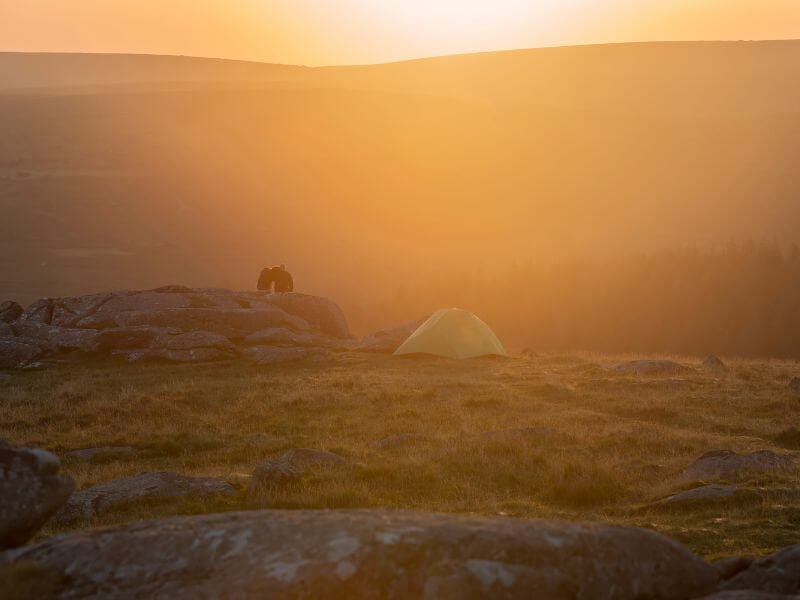
In addition to the legal considerations around wild camping, it is also important to be aware of other laws and regulations that may apply when camping in Dartmoor National Park.
For example, you may need to obtain a permit to light a campfire or use a camping stove, and there may be restrictions on the use of certain types of equipment, such as drones. Be sure to research these regulations before you set out on your camping trip to avoid any legal issues.
When camping on Dartmoor, it is important to follow the Leave No Trace principles to minimize your impact on the environment. This includes packing out all trash and waste, minimizing campfire impact, and respecting wildlife and other visitors.
If you are new to wild camping, it is recommended to start with a guided tour or join an experienced group to learn the necessary skills and safety precautions.
Frequently Asked Questions
Hope you found this guide helpful. If you’d like to visit other areas in the South West of England, make sure to check out my guides to Somerset, Cornwall, and Dorset.
